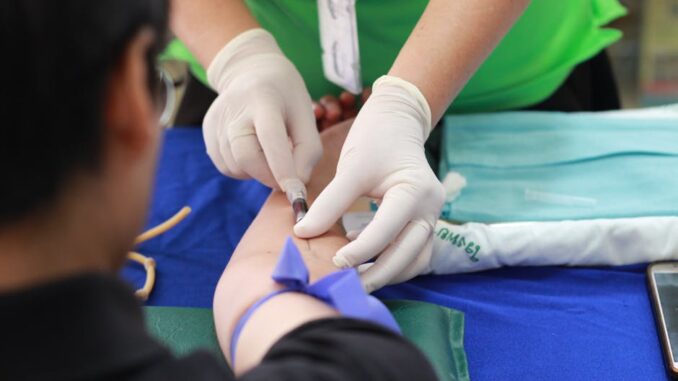
Summary
This article explores the latest advancements in diabetes medications, focusing on their effectiveness in blood sugar control and weight management. It discusses groundbreaking drugs like tirzepatide (Mounjaro) and other GLP-1 receptor agonists, highlighting their dual-action mechanism. The article also emphasizes the importance of personalized treatment plans and the potential of these medications to improve the lives of individuals living with diabetes.
See how TrueNAS offers real-time support for healthcare data managers.
** Main Story**
Diabetes: It’s a relentless challenge, impacting millions worldwide, right? But, the good news is the pharmaceutical industry is stepping up, constantly pushing for better ways to manage it. We’re seeing some really exciting progress in diabetes meds, offering real hope for those struggling with blood sugar control and weight management – two of the biggest hurdles in preventing long-term complications.
Game-Changing Meds: A New Chapter in Diabetes Treatment
What’s particularly exciting is the rise of meds that do more than just regulate blood sugar. They’re helping with weight loss too, which is a massive win. Think about it, it’s like hitting two birds with one stone! Take tirzepatide (Mounjaro) for example. The FDA approved it back in 2022, and it’s a real first-of-its-kind drug.
It works by targeting both GIP (glucose-dependent insulinotropic polypeptide) and GLP-1 (glucagon-like peptide-1) receptors. This dual action leads to better insulin secretion, less glucagon production, and slower digestion, leading to improved blood sugar control and significant weight loss.
And get this: as of December 2024, the NHS in the UK approved Mounjaro for treating obesity, with rollout from April 2025. It’s a sign of how impactful this medication could be. I mean, who wouldn’t want that kind of boost, honestly?
GLP-1 Receptor Agonists: A Powerful Ally
Then there are GLP-1 receptor agonists, which are kind of like the rockstars of diabetes management right now. They mimic the effects of the natural hormone GLP-1, kicking off a chain reaction that includes stimulating insulin release, suppressing glucagon, and slowing down digestion. The result? Improved blood sugar levels and, often, weight loss.
We’ve got several options available, like semaglutide (Ozempic, Wegovy), dulaglutide (Trulicity), and liraglutide (Victoza, Saxenda). Clinical trials have shown impressive results, with these meds lowering A1C levels (a measure of average blood sugar) and promoting significant weight loss. That’s not all! These medications have been proven safe for the mental health of individuals living with diabetes.
SGLT2 Inhibitors: Protecting Your Heart and Kidneys
SGLT2 inhibitors are another class making waves. They work by preventing the kidneys from reabsorbing glucose, so it gets excreted in the urine instead. This, of course, lowers blood sugar. But here’s the kicker: they also offer cardiorenal benefits, reducing the risk of cardiovascular problems and kidney disease in people with type 2 diabetes. Drugs like empagliflozin (Jardiance), canagliflozin (Invokana), and dapagliflozin (Farxiga) fall into this category.
The Importance of Personalised treatment plans:
Look, it’s easy to get excited about these new meds. However, you’ve got to remember that diabetes management isn’t a one-size-fits-all thing, not at all. A personalized plan, tailored to your specific needs and medical history, is still the most important thing. When your doctor figures out the right treatment for you, they’re considering things like the type of diabetes you have, how long you’ve had it, any complications, and any other medical conditions.
This might mean a mix of meds, lifestyle changes (like diet and exercise, of course), and keeping a close eye on your blood sugar. It’s a team effort, with you and your healthcare provider working together.
Type 1 Diabetes: A Reason for Optimism
Now, what about type 1 diabetes? Well, the approval of teplizumab (Tzield) is a huge step forward. This immunotherapy drug can actually delay the onset of stage 3 type 1 diabetes in people at high risk. Think about it, that’s a chance to prevent or at least push back the progression of an autoimmune disease. And research is already underway to see if combining teplizumab with other therapies could lead to even better outcomes.
Looking Ahead: A Brighter Future
All in all, the future of diabetes management looks brighter than ever, wouldn’t you agree? From drugs like tirzepatide to breakthroughs in immunotherapy for type 1 diabetes, things are changing fast. And as we continue to learn more about the underlying mechanisms of this disease, we can expect even more effective and personalized treatments to come along. So, here’s to a future where people with diabetes can live healthier, fuller lives. That’s something worth striving for.


“Rockstars of diabetes management,” you say? Do they get groupies offering them sugar-free snacks? And if Big Pharma are the rockstars, are doctors their roadies, constantly tuning up our personalized treatment plans? Just curious!
That’s a fun way to put it! The “roadie” analogy is quite apt. Doctors *are* instrumental in fine-tuning treatment plans. Finding the right combo of medication, diet, and exercise is key, and they’re the experts guiding us through it all! What other roles would you assign to those involved in diabetes care?
Editor: MedTechNews.Uk
Thank you to our Sponsor Esdebe